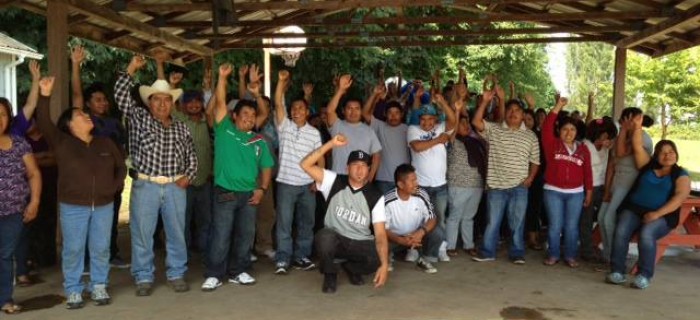It’s a Labor Dispute, Not a “Cultural Misunderstanding”: Sakuma workers organize
Since their first walkout on July 10th, berry pickers on Sakuma Brothers Farms in Burlington, Washington have struck several times in protest of their sub-minimum wages, racial discrimination, poor living conditions, and workplace intimidation. In face of these egregious labor violations, workers have remained steadfast in their ongoing fight to improve their conditions, and they have formed their own organization called Las Familias Unidas por La Justicia (“Families United For Justice”).
Sakuma Violates Retailers’ Labor Codes
Specializing in berries, the Sakuma Brothers Farms sells a large portion of its crop to the Häagen-Dazs ice cream company. General Mills owns Häagen-Dazs, and Nestlé USA controls Haagen-Dazs’s distribution in the United States. Both Nestlé USA’s “Supplier Code”[1. http://www.nestle.com/asset-library/documents/library/documents/suppliers/supplier-code-english.pdf] and General Mills’ “Supplier Code of Conduct” outline strict standards on labor and require that their suppliers:
- compensate their workers with pay and benefits that comply with applicable minimum wage and overtime requirements
- provide workers with a safe, clean, and healthy work environment, “and where provided, safe housing conditions […] maintained in accordance with the standards set by applicable codes and ordinances.”
- shall not discriminate or harass their employees.
Both companies also state that they have the right to terminate contracts with any suppliers who do not comply with the labor code. Häagen-Dazs has already contacted Sakuma Farms to ask for an explanation of the ongoing strikes and protests.
Familias Unidas por la Justicia claims that Sakuma Berry Farms has blatantly violated these standards. In addition to complaints of racist and sexist treatment at the hands of Sakuma Farms’ labor contractors, workers believe that Sakuma Farms has systematically withheld wages over the years. Furthermore, they claim that supervisors have routinely threatened them into working through their rest breaks. Finally, the workers’ cabins and bathrooms are over-crowded, filthy, and in disrepair.
It’s a Labor Dispute, Not a “Cultural Misunderstanding”
In response to the work stoppages and outside pressure from media and Skagit County residents, Sakuma’s owners are participating in ongoing negotiations with Familias, but have taken a hard-line attitude, hiring high-powered corporate labor attorneys, consultants, communications specialists, and security guards. In an attempt to sway public opinion (and avoid the legal implications of a formal strike), Sakuma Brothers frames the issue not as a labor dispute, but as a “cultural misunderstandings” due to “miscommunication.”
Stay in the loop with Food First!
Get our independent analysis, research, and other publications you care about to your inbox for free!
Sign up today!As one of the workers put it: “I don’t know what country you’re from, but there’s no way to misunderstand when you can’t work for minimum wage, when your mattresses are so dirty and covered with bugs that you can’t sleep, and when your boss calls you a stupid donkey.”
It’s clear that Sakuma would like to portray this as a “cultural misunderstanding” because the moment that they call it a “labor dispute,” the U.S. Department of Labor can get involved and cancel their request for H-2A guest workers. Sakuma Farms was expecting a crew of H-2A workers to arrive in early August, but the Department of Labor has put a temporary hold on their request, presumably because the current so-called “cultural misunderstandings” on Sakuma Farms look suspiciously like a labor dispute.
Workers’ Organizing Accomplishments
The majority of the workers are indigenous Triqui and Mixteco people from Oaxaca, Mexico. Most of them are poor migrant workers who travel all over California during the wintertime, doing fieldwork wherever they can find it. Some of the families have been returning to Sakuma Farms for the past 13 years, and some of the families come from the same towns in Mexico, so their general familiarity and shared cultures have built the foundation for the powerful organizing that they have been able to do over the past five weeks.
The strikers, along with the support of local community protestors and media coverage, have earned several important accomplishments. The work of Familias Unidas has unified all of the workers at Sakuma Farms in their belief that they have rights and will fight for them.
In addition, as a result of the workers’ pressure on July 10th, Sakuma Farms employers immediately agreed to re-hire Federico Lopez (a farmworker who had initiated the first walk-out and was then fired to set an example). Recently, Sakuma Farms employers agreed to include the worker committee in management’s process of determining the price per pound of berries picked. Additionally, Sakuma management agreed to transfer an abusive supervisor out of the work crew, and replaced him with a more reasonable one. And finally, they re-purposed and cleaned some of the workers’ cabins and bathrooms.
Ongoing Struggle
Despite these accomplishments, workers fear that they will not be permanent since they have not been formalized in writing. The workers want to see concrete standards set in place to define their wages, their rights, and their protection from retaliation. But so far, negotiations have been moving along slowly, and Sakuma Farm’s attorneys and ownership have been dragging their heels and have shown reluctance to make permanent changes.
In retaliation against the workers’ actions, Sakuma Farms has been hiring replacement workers from the Skagit County community. As of today, August 15th, striking workers have already lost a total of three weeks’ worth of wages, and they are greatly concerned about their job security.
Familias Unidas believes that consumer pressure will likely be needed to influence the company to support workers’ demands. They are urging supporters to make phone calls to Sakuma Brothers Farms, to Nestlé, and to General Mills to urge them to respect their labor codes of conduct.
For more updates and information on the struggle and how to get involved, visit Community to Community Development’s website and Facebook page, or email Rosalinda Guillén at rosalindag@qwestoffice.net.


 Help Food First to continue growing an informed, transformative, and flourishing food movement.
Help Food First to continue growing an informed, transformative, and flourishing food movement.




